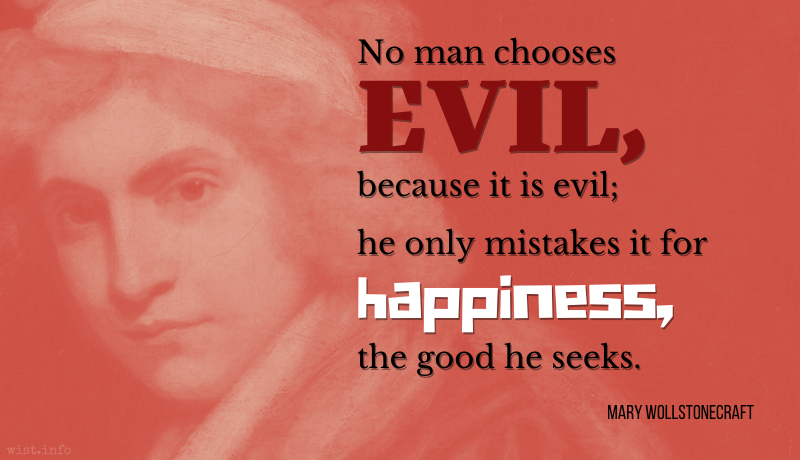It may be confidently asserted that no man chooses evil, because it is evil; he only mistakes it for happiness, the good he seeks.
Mary Wollstonecraft (1759-1797) English social philosopher, feminist, writer
A Vindication of the Rights of Men (1790)
(Source)
Quotations by:
Wollstonecraft, Mary
Taught from infancy that beauty is woman’s sceptre, the mind shapes itself to the body, and roaming round its gilt cage, only seeks to adorn its prison.
Mary Wollstonecraft (1759-1797) English social philosopher, feminist, writer
A Vindication of the Rights of Woman, ch. 3 (1792)
(Source)
“Educate women like men,” says Rousseau, “and the more they resemble our sex the less power will they have over us.” This is the very point I aim at. I do not wish them to have power over men; but over themselves.
Mary Wollstonecraft (1759-1797) English social philosopher, feminist, writer
A Vindication of the Rights of Woman, ch. 4 (1792)
(Source)
Usually elided to "I do not wish women to have power over men; but over themselves."
It is justice, not charity, that is wanting in the world!
Mary Wollstonecraft (1759-1797) English social philosopher, feminist, writer
A Vindication of the Rights of Women, ch. 4 (1792)
(Source)
Nothing contributes so much to tranquilize the mind as a steady purpose, — a point on which the soul may fix its intellectual eye.
Mary Wollstonecraft (1759-1797) English social philosopher, feminist, writer
Frankenstein, Letter 1 (1818)
(Source)
More discussion of the history of this quotation: Nothing Contributes So Much To Tranquillize the Mind As a Steady Purpose,—a Point On Which the Soul May Fix Its Intellectual Eye – Quote Investigator
Executions, far from being useful examples to the survivors, have, I am persuaded, a quite contrary effect, by hardening the heart they ought to terrify. Besides, the fear of an ignominious death, I believe, never deterred anyone from the commission of a crime, because in committing it the mind is roused to activity about present circumstances.
Every political good carried to the extreme must be productive of evil.
Mary Wollstonecraft (1759-1797) English social philosopher, feminist, writer
The French Revolution, Book 5, ch. 4 (1794)
(Source)
Nothing, I am sure, calls forth the faculties so much as the being obliged to struggle with the world.
Mary Wollstonecraft (1759-1797) English social philosopher, feminist, writer
Thoughts on the Education of Daughters, “Matrimony” (1787)
(Source)


